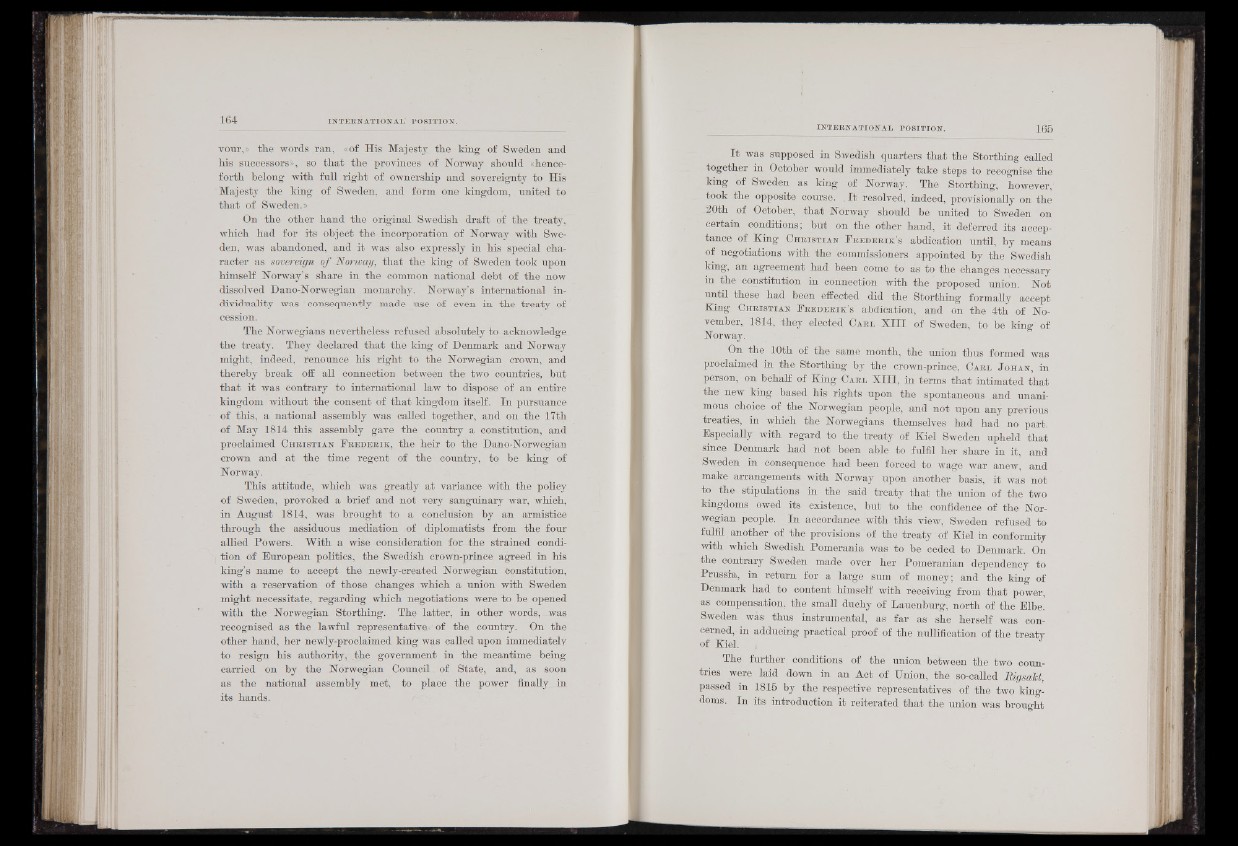
t o u t ,» the words ran, «of His Majesty the king of Sweden and
his successors», so that the provinces of Norway should «henceforth
belong with full right of ownership and sovereignty to His
Majesty the king of Sweden, and form one kingdom, united to
that of Sweden.»
On the other hand the original Swedish draft of the treaty,
which had for its object the incorporation of Norway with Sweden,
was abandoned, and it was also expressly in his special character
as sovereign o f Norway, that the king of Sweden took upon
himself Norway’s share in the common national debt of the now
dissolved Dano-Norwegian monarchy. Norway’s international individuality
was consequently made use of even in the treaty of
cession.
The Norwegians nevertheless refused absolutely to acknowledge
the treaty. They declared that the king of Denmark and Norway
might, indeed, renounce his right to the Norwegian crown, and
thereby break off all connection between the two countries, but
that it was contrary to international law to dispose of an entire
kingdom without the consent of that kingdom itself. In pursuance
of this, a national assembly was called together, and on the 17th
of May 1814 this assembly gave the country a constitution, and
proclaimed C h r i s t i a n F r e d e r i k , the heir to the Dano-Norwegian
crown and at the time regent of the country, to be king of
Norway.
This attitude, which was greatly at variance with the policy
of Sweden, provoked a brief and not very sanguinary war, which,
in August 1814, was brought to a conclusion by an armistice
through the assiduous mediation of diplomatists from the four
allied Powers. With a wise consideration for-the strained condition
of European politics, the Swedish crown-prince agreed in his
king’s name to accept the newly-created Norwegian Constitution,
with a reservation of those changes which a union with Sweden
might necessitate, regarding which negotiations were to be opened
with the Norwegian Storthing. The latter, in other words, was
recognised as the lawful representative» of the country. On the
other hand, her newly-proclaimed king was called upon immediately
to resign his authority, the government in the meantime being
carried on by the Norwegian Council- of State, and, as soon
as the national assembly met, to place the power finally in
its hands.
I t was supposed in Swedish quarters that the Storthing called
together in October would immediately take steps to recognise the
king of Sweden as king of Norway. The Storthing, however,
took the opposite course. . I t resolved, indeed, provisionally on the
20th of October, that Norway should be united to Sweden on
certain conditions; but on the other hand, it deferred its acceptance
of King C h r i s t i a n F r e b e r i k ’s abdication until, by means
of negotiations with the commissioners appointed by the Swedish
king, an agreement had been come to as to the changes necessary
in the constitution in connection with the proposed union. Not
until these had been effected did the Storthing formally accept
King C h r i s t ia n F r e b e r i k ’s abdication, and on the 4th of November,
1814, they elected C a r l X III of Sweden, to be king of
Norway.
On the 10th of the same month, the union thus formed was
proclaimed in the Storthing by the crown-prince, C a r l J o h a n , in
person, on behalf of King C a r l XIII, in terms that intimated that
the new king based his rights upon the spontaneous and unanimous
choice of the Norwegian people, and not upon any previous
treaties, in which the Norwegians themselves had had no part.
Especially with regard to the treaty of Kiel Sweden upheld that
since Denmark had not been able to fulfil her share in it, and
Sweden in consequence had been forced to wage war anew, and
make arrangements with Norway upon another basis, it was not
to the stipulations in the said treaty that the union of the two
kingdoms owed its existence, but to the confidence of the Norwegian
people. In accordance with this view, Sweden refused to
fulfil another of the provisions of the treaty of Kiel in conformity
with which Swedish Pomerania was to be ceded to Denmark. On
the contrary Sweden made over her Pomeranian dependency to
Prussia, in return for a large sum of money; and the king 0f
Denmark had to content himself with receiving from that power,
as compensation, the small duchy of Lauenburg, north of the Elbe.
Sweden was thus instrumental, as far as she herself was concerned,
in adducing practical proof of the nullification of the treaty
of Kiel. ;
The further conditions of the union between the two countries
were laid down in an Act of Union, the so-called Rigsalct,
passed in 1815 by the respective representatives of the two kingdoms.
In its introduction it reiterated that the union was brought